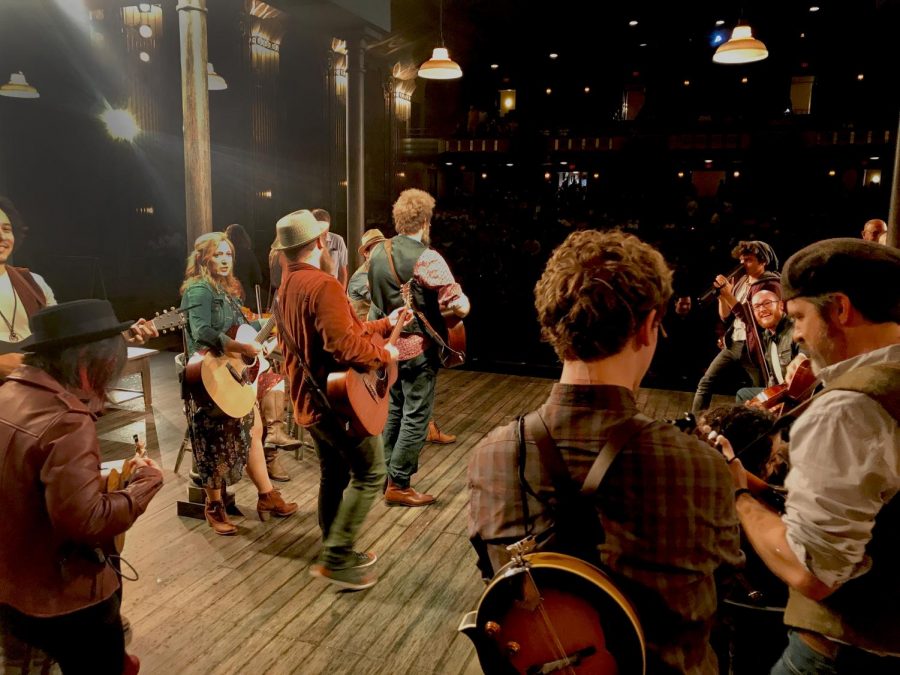You can never just walk away: Thematic insight into Paramount’s production of the musical ‘Once’ (How the themes become one with the viewer)
Photo by Jennifer Kurz: The Cast of Paramount’s ‘Once’ performs on stage as patrons are served at the stage bar
June 21, 2018
Shove your fist down your throat. Rip out your aching heart.
Place it down, bleating in the tragic light before you. And watch the shadows befall it as you turn your back to forever walk away.
Darkness, insidiously encroaching upon your every dream and desire. Swallowed in a vacuum of abandoned desolation.
And then the violin bow timidly embraces the taught steel strings. A flourish.
Suddenly, wafts of distilled barley and tremulous harmonic chords cut through the chilled night air. A golden melody shimmers in pirouette. An Irish blaze dances in the darkness.
And the healing has begun.
You can never just walk away.
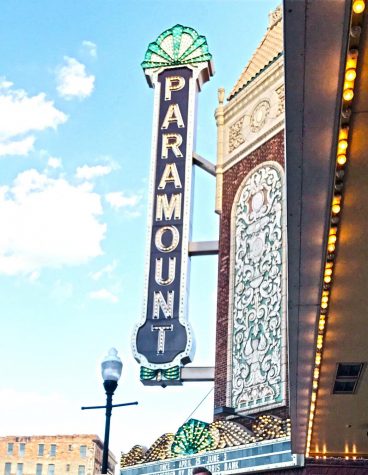
The warmth of a pulsating stage light falls upon the reveal of boots tapping out a Celtic thunder. A congregation of jubilant musicians kinetically falling in and out of motion. The audience’s gaze darts from one spotlit instrument to the next. Staged as an idyllic Irish pub, with open bottles of libation permeating the theater air and musing patrons.
Aurora’s Paramount Theatre ran a production April 25th-June 3rd, attempting to replicate the spellbinding magic of Once, the 2012 Broadway play that captured eight Tony awards, including Best Musical. The play was inspired by the 2007 Irish musical drama Once, which instantly became an indie darling. “Falling Slowly” won the 2007 Academy Award for Best Song.
Paramount Artistic Director Jim Corti, maintained the original Broadway Director John Tiffany’s ingenious innovation of having the stage bar function as a real pub. Up on stage, Irish beer and whiskey were served to audience members before the play and during intermission. All while the cast continued to play on stage with a fervent Irish brogue.
Music laced with whiskey and the anguish of healing, coloured the atmosphere’s timbre, breaking down the third-wall without even trying. The audience becomes active participants with the play, carrying the themes inside them. Every viewer, with an open mind, becomes a play within a play.
The unique character of the theater enables this magic to transpire.
Entering through Paramount’s magnificent 1931-designed Art Deco frames, bittersweet violin exultations reverberate beneath the Venetian-inspired, royal blue-and-gold vaulted ceiling. The music captures us, and we follow in its dance. We soar together as the violin bounces off burgundy Venetian murals inside the opulent chandelier-adorned theatre. In its rich history, the theatre has seen the graces of Frank Sinatra, B.B. King and Duke Ellington. In the early years it even witnessed the provocative nude burlesque of Sally Rand tempting the audience behind flourishes of her massive ostrich feather fan. Each act leaving vestigial echoes of their wonders.
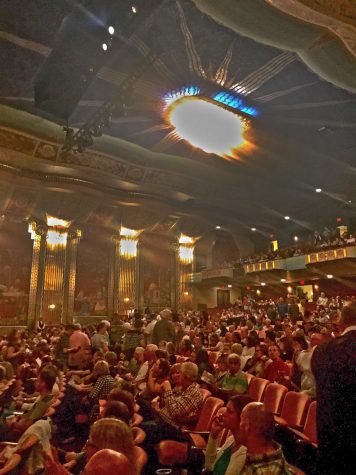
Beneath the vaulted ceiling, there is a magical breakdown of separation between audience and the stage. Music breathes. It takes shape and exists in its abstract form. The rhapsody connects actors and the audience in a dramatic flood of emotional fluidity.
The themes of the musical permeate the consciousness. We open ourselves to its enticement.
Our beleaguered souls exist as lonely instruments waiting for someone to pluck the strings. We are empty receptacles until someone fills our void with song, and awakens us into life.
When a guy, named Guy, bellows out an acoustic primal scream of emotion, the unwavering pressure crystallizes a cathartic diamond within the listener. His pain is reinforced with the transposed pain of each empathetic individual in the audience. The music captures your memories and displays them behind an emotional prism, inducing a sentimental journey of self-discovery. The plot is secondary to the emotional imagery.
Guy, an Irish Hoover (vacuum) repairman and busker musician in the streets of Dublin, played by the New York-based singer and actor, Barry DeBois, sings one last song, entitled “Leave.” He tears through his chords with all the pain in his heart. He penned the song to a lost love who has come to define his life. One last song. Guy then proceeds to leave his guitar, representing so much more than just an instrument, in the street and forever walk away.
However, you can never just walk away.
There is a fatalist determinism forever impeding moving on. As Guy later croons in burdened desperation, “When your mind’s made up, there’s no point in trying to stop it.” The heart is forever damned to its fate.
As the shadows fall upon his dreams, out of the mystic walks an effervescent Czech pianist, a girl named Girl. Girl is wearing her manic pixie dream girl mask as a facade, hiding the complexity of her vulnerabilities. Embodying the Leo Tolstoy quote, “True life is lived when tiny changes occur,” this deus ex machina romantic saviour magically enters with broken Hoover in hand.
And the healing has begun.
Girl, played by the vibrant Oswego native, Tiffany Topol, pays for the repair of her broken Hoover by playing classical music for Guy on a local music store’s piano. She can’t afford a piano of her own, and she is enamored by its beauty.
The predictable storyline cliche, guy meets girl, falls in love and lives happily ever after, seems to be undermined by harsh chords of fraught realism. While never played, the chords and lyrics of Smokey Robinson seem to be insinuated under every attempt at romance. Behind each character’s sincere interaction rings out the tune, “I don’t like you, but I love you. Seems that I’m always thinking of you. You treat me badly; I love you madly. You really got a hold on me.” The past has a funny way of lingering. Both characters try to hide the fact they are trapped by an unrequited cosmic fate from precious moments already lost.
As a romantic entanglement buoys their souls together, the characters fall into the harmonized “Falling Slowly.” The first of their duets reveals the realism undermining the plot, “And games that never amount, to more than they’re meant, will play themselves out.”
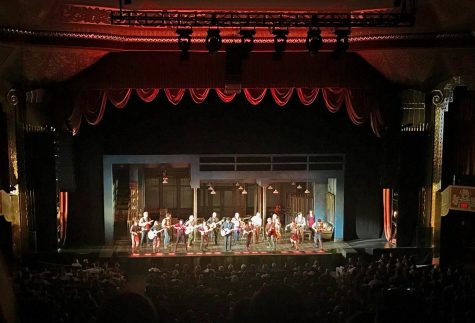
Moments come into our lives, bless us with their graces, and then fade into memory. There is an ephemeral nature to transcendence. The tragic vein coursing throughout the play reveals how life-altering epiphanies bloom for a moment, but were never meant to stay. Whether for a minute, or for a year, you can only capture their magic once.
Guy opens himself to Girl’s magic, and she tenderly plucks the strings. “Falling slowly, sing your melody. I’ll sing along.”
In a cathartic quest, Girl ambitions to save this Dubliner “Broken-hearted Hoover fixer sucker guy.” Her seemingly-selfless ambition is to reignite his passion for music and therefore help him once again pursue the lost love at the center of his songs.
However, in her ethereal mystic song, “If You Want Me,” Girl reveals herself to be just as burdened as Guy. Singing to the memories of a tragic love, Girl’s desperate plea for life is, “If you let me be free.” Wounded and abandoned, she continues on her quest to save Guy from her own fate.
Throughout the play, a tension develops between love and the process of healing. Are the two the same? Does one inspire the other?
As the characters explore healing together, love drips slowly in moments of gold. But realizing the precious evanescence of love, they sing, “If your life was gold, how long do you think you’d stay living?” The transient nature of romantic ecstasy can never sustain a damaged soul. Moments of magic are brief blips in life’s indifference.
No matter how concrete their affections, their hearts remain fated to their pasts. Love acts not as an obstacle to moving on, but as a catalyst for healing.
We live our days one disturbance to our rhythmic vibrations at a time. A temporary alleviation from the banality of life. A golden coincidence disrupts our daily grind, and for a moment, we lift our heads to hear the music. We seek for a melody to fill us. And we search for another soul’s receptacle, to fill with the cosmic vibrations of our own tragic songs.
Even if it was only for a moment, Girl’s warmth touched the deepest part of Guy’s anguish.
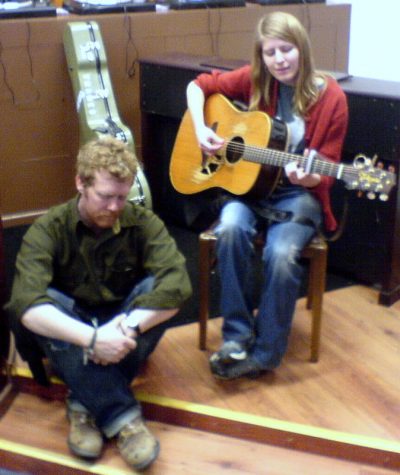
To critique DeBois and Topol’s performance, you must capture their emotional resonance with the audience. There is a scene in the 2001 French film Amelie, where the main character says her favourite part of going to theaters is turning around to see the expressions on everyone in the audience’s face. Turning around to catch a glimpse in the soft half-light, the visceral gut-wrenching tone of DeBois’ bellow, or the fragile, yet comforting, timbre of Topol’s voice had the audience spellbound. Faces frozen in a perpetual wonder and excitement. Lost to spontaneous reverie, the music induced a catharsis of the audience’s own tragic and triumphant memories. Golden images were created forever solidified in the mind. The music becomes interactional.
Beneath the vaulted Venetian ceiling, music filled their hollow shells if only for a moment.
The object of your attention carries less importance than the fluidity of motion dancing around its peripheries.
(spoilers henceforth: proceed at own risk)
Guy never loses sight of his lost love, eventually taking Girl’s advice and pursuing his lost love to America. Girl is left behind in Dublin to reconnect with her estranged husband. It’s never the moments or the people we expect, when it comes to what defines our lives, what defines who we become. If they interacted only once, for a brief moment of time, Guy was forever transformed by Girl’s love of life. The strangest things become part of who we are.
In gratitude, and in hope the memory of each other never fades, Guy leaves a present for Girl. A big, red bow covers her desired treasure from the Dublin music store. She once again runs her fingers across the keys of the piano she first played for him and in harmony they sang around.
Girl sits down at the piano, and together, an ocean apart, she and Guy sing a heartbreaking refrain of “Falling Slowly.” The refrain elucidates in the heart what could have been, and what always had to be. An unrequited, yet tragically-fulfilled across the universe duet. And then the heart catches breath from its reprieve. Life carries on.
A flourish, and the stage capitulates to darkness.
The doors beneath the giant art-deco frames swing open, and we magic-hungry, empty shells turn our backs on the stage to walk away.
And then the violin bow timidly embraces the taught steel strings. A resonance of the musical’s themes survive. Reverberations echo down our meandering thoughts. We embrace the music, our dreams take shape, and one by one we fade off into the mystic.

